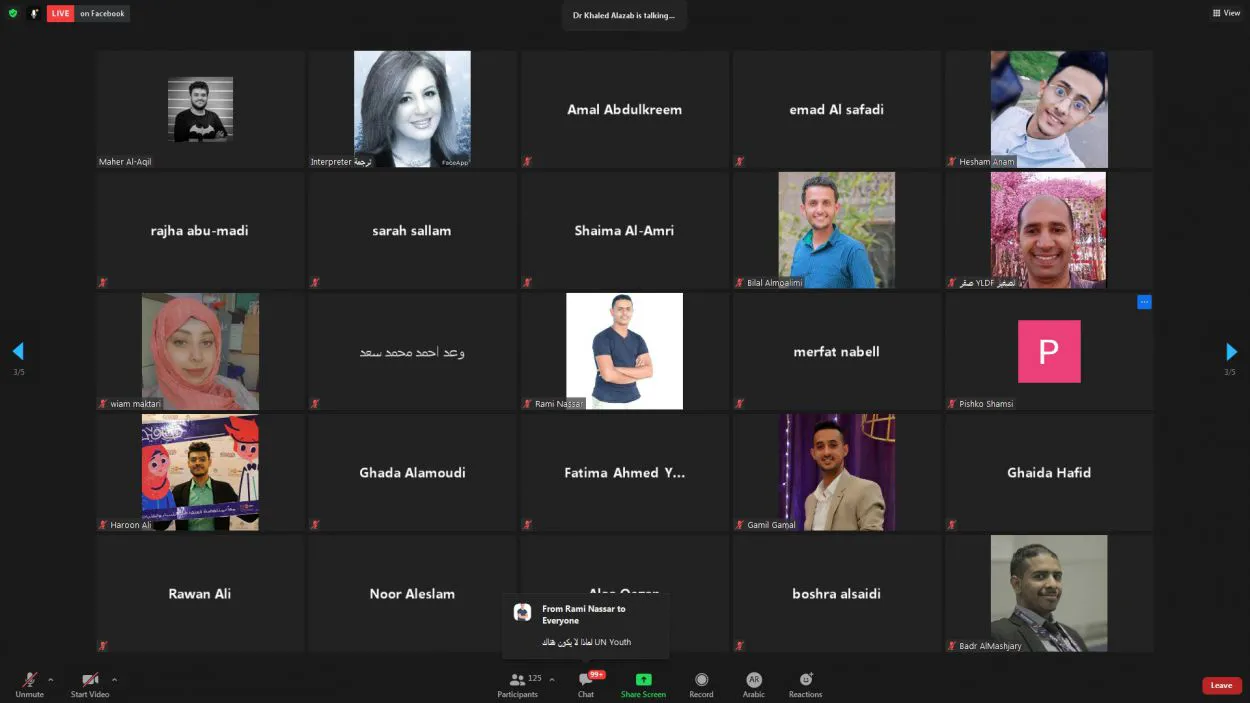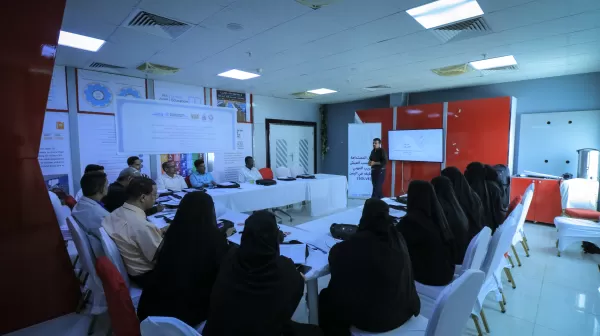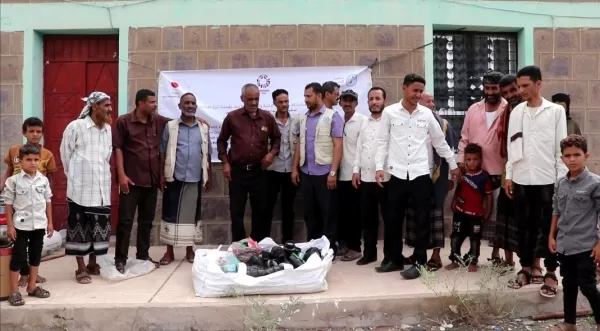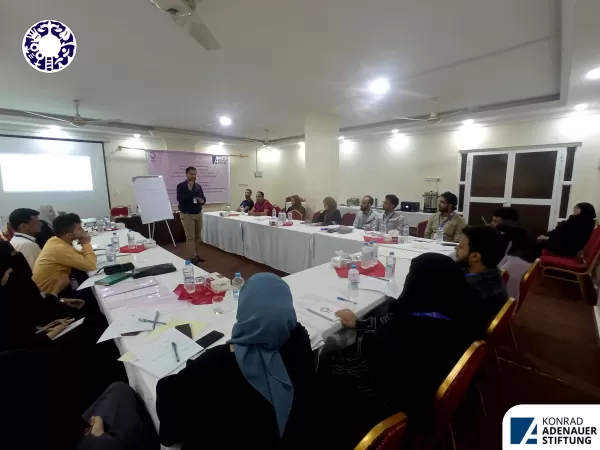Yemen's young men and women have called to be involved in the decision-making of the mechanisms of efforts towards peace, including political negotiations, expanding partnerships at the level of official institutions, the civil and private sector, youth components, international organizations and other active sectors, as well as adopting programs of coexistence and economic and social integration that will enable them to enter the labor market.
This came in the final statement issued by the Yemen Youth Conference for Peacebuilding, which was organized for three days by the Youth Leadership Development Foundation in cooperation with Youth Without Borders, in partnership with the Nine Feminist Alliance and with the support of UN Women and the United Nations Population Fund, with wide participation of the young men and women of Yemen at home and abroad, and an active presence of decision-makers at the international level, headed by the UN envoy to Yemen Martin Griffiths, representatives of a number of United Nations agencies, the European Union ambassador and the British ambassador to Yemen.
Participants in the conference stressed the need to strengthen their role in the peacebuilding process and decision-making in its various stages and levels, and to include them within the delegations of negotiations and in the peacebuilding process. They also called the UN envoy to Yemen to include Yemeni young women and men in his advisory team and recommended all parties and international actors, including the UN envoy to put in place effective mechanisms to implement UN resolutions 2250 and 2419.
At the conference, which was held in coordination with the Office of the United Nations Special Envoy to Yemen, the young men and women stressed the importance of strengthening human security and a long-term approach to addressing and preventing the root causes of conflict, by urging the Member States to invest more resources in peaceful institutions and initiatives, including the adoption of Gender-sensitive economic and social development policies, and gender mainstreaming in security sector reform programs and the transitional justice mechanism.
More than a thousand young men and women who participated in the conference, through the "Zoom" program and conference halls in a number of governorates and countries, and consultative meetings, demanded the need to release all detainees and forcibly disappeared persons, to be held accountable for human rights violations and to end the policy of impunity, as well as to stop child recruitment and forced recruitment.
They also called on the UN envoy and the international community to put pressure on all parties to open corridors and roads between Yemeni cities and regions such as Taiz, Al Dhale, Sana'a, Marib, Hodeidah, and Lahj, to open Sanaa International Airport and other Yemeni airports to commercial flights, and end all restrictions and obstacles imposed on the activities of young women and men and on civil society in general, in all regions.
They stressed the importance of neutralizing education from conflict, economic empowerment programs, and projects, programs, and projects to build the capacities of young women and men in various fields, as well as ensuring and promoting equal opportunities in education and work.
They stressed the need to reject the language of terrorism, extremism, and violence, to enhance trust between local communities and civil society organizations, and to ensure that organizations apply the principles of good governance and participation with local communities. Integrating youth and gender perspectives into all levels of programs and administrative structures, enhancing coordination and integration between organizations at all levels, and ensuring availability and tracking of funding that takes into account the priorities of the agenda of young women and men, and women, peace and security at the local level.
The recommendations of the young men and women included pressure to stop foreign interference and external military support to prevent the escalation of the conflict and to seek to activate dialogue between Yemenis according to national rules that are not linked to external wills.
The conference started with an opening session moderated by the representative of UN Women in Yemen and Iraq, Dina Zorba, in which she emphasized the importance of its outcomes that will contribute to empowering young men and women based on United Nations Security Council Resolution 2250 on Youth, Peace and Security, "which is an opportunity that can allow young people to play an important and positive role in preserving the environment and promoting international peace and security. "
The UN envoy to Yemen, Martin Griffiths, also spoke, saying: “The parties to the conflict in Yemen should be responsible for bringing peace.” He was surprised that the political parties did not involve women and youth in the negotiations. “You all noticed that we are trying for that. Two years ago we went to Sweden, and only one woman was participating in the negotiations despite the progress made in the National Dialogue Conference, and that was a failure.
On the other hand, the European Union Ambassador to Yemen, Hans Grundberg, touched on developmental difficulties and the hope of overcoming them, saying: “The European Union delegation emphasized the importance of gender equality as a basic approach in all its efforts and everything it does, for us we believe in the importance of integrating women and youth and men to end the conflict in Yemen. "
In turn, the British ambassador to Yemen, Michael Aaron, stressed that ending the fighting is an effort that everyone must make.
"Without coordination, the war will continue, and without action and determination to achieve progress, peace will not be achieved, and we in the United Kingdom are committed to ending this war as soon as possible," he added.
For her part, the Regional Director of UN Women in the Arab States, Suzana Mikhael, stressed that youth are knowledge, leadership, and energy and that their inclusion and the inclusion of women in decision-making processes is also an opportunity to make a transformation in order to stop violence, given that young people are the strength and wealth that we have in order to stop the violence.
Mikhail stressed the need to implement Resolution 2250 and invest in young men and women for the sake of a safe society, pointing out that this resolution urges member states to give young people a greater role, and this is what the United Nations is working on and requires raising this role.
UNFPA representative Nestor Umuhanji said that everyone should work with youth to achieve peace, and spoke about the importance of youth participation in solving problems in their societies, "Young people are the largest part of society and they are the most important groups, and Yemeni youth have the power to make real change, and I call for supporting their initiatives, we appreciate and thank them for their great roles and commitment to the future. "
At the conclusion of the conference activities, the chief gender expert at UN Women, Rawan Ababneh, praised the interaction of the participants over a period of three days. She said, "We will be in contact with various governments, partners, the UN envoy’s office, local networks and working in youth, and this conference is only an introduction to emphasize the role of youth in security and peace, and many of the recommendations touched sensitive and important Yemeni issues, this indicates that young people are fully aware of national issues and we bet on you in building peace. ” She addressed the youth: “After the conference, we will launch an advocacy campaign to ensure the implementation of the conference’s outcomes. Women will be with you to press for the implementation of an agenda. "Women and Peace. "
UNFPA Youth Agenda Officer Wael Arim said: “We affirm that we at the United Nations Population Fund will continue to work side by side with our partners in order to implement the recommendations and advance the peace and security agenda, build knowledge and build the capacities of young men and women, and we will support young men and women, youth groups and youth consensus to work from for peace. "
The head of the Youth Without Borders Organization, Majid Al-Khulaidi, affirmed that youth played an important role in the third track of building peace and social coexistence. He said: “Young people have the ability today to say we are here, and they will reflect the visions and aspirations of many groups.”
He also stressed the importance of the partnership between the various components and work towards the national interest, stressing that the feminist components are the role models that should be emulated, and the consensus had its pioneering experience in the field of peace.
Director of the Youth Leadership Development Foundation, Safaa Rawiah, for her part, congratulated the young men and women on the success of the conference and said: “We believe in the capabilities and energies of youth and we will make a lot of efforts for you in order to make young people effective and able to present ourselves better, and these outputs are a cornerstone of youth work in Yemen and it will be for youth a space for work, establishing sustainable peace and activating Resolution 2250 ", and praised the serious and important dialogue that took place during the conference days ... stressing that these dialogues will be translated into practical programs that serve youth.
During 9 sessions, conference participants reviewed the results of youth consultations, in which 990 young men and women participated in ten governorates in the first phase, and from all governorates in the second phase.
The second session dealt with the role of youth in building peace worldwide "Creating and enabling a suitable environment", in which Afra Mir from Kashmir, Roxana Viva from Venezuela, Marseille Yacoub and Manal Mahmoud from South Sudan, and Gwendolen Merz from Liberia spoke about their experiences of participating in the building process Peace in their countries, about the challenges they faced because they were young women or because they were females as a result of discrimination based on gender, and about the lessons learned from these experiences and made recommendations for the benefit of young men and women in Yemen.
The third session was devoted to discussing protection and prevention, in which the British Ambassador to Yemen Michael Aaron spoke, UN Women’s expert for advocacy in the Regional Office in Egypt Emad Karim, Regional Youth Adviser at the United Nations Population Fund, Samer Anouti, and security experts Heather Kayon and General Alex Mackintosh.
While the fourth session dealt with the efforts of women and youth in Yemen, “What has been done and what is planned”, Lamia Al-Eryani, representative of the Yemeni Feminist Pact for Security and Peace, and the representative of the Group of Nine Coalition Fatima Mashhour, talked about the Youth Compatibility for Peace and Security Jamal Al-Sabri, Ola Al-Saqqaf.
The conference program for the second day included a presentation by Wamid Shaker, which dealt with building a common understanding of the draft strategic framework for Security Council Resolution No. 2250 for Youth, Peace, and Security in Yemen, and collecting observations on the context, problems, impact, strategic objectives, priorities, strategies or approaches, as well as building a common understanding. For the operational framework for the draft strategic framework; Collecting feedback on governance, structure, coordination, and operation.
The sessions on the second day, which were facilitated by 9 facilitators, focused on the framework for action on strategies for participation, protection, prevention, partnership, and reintegration based on UN Resolution 2250.
It is noteworthy that the conference included activities in Turkey, Egypt, Jordan, Russia, Germany, Malaysia, and America, which were virtually linked to a unified session, and with the participation of local conferences held simultaneously in a number of Yemeni cities, Sanaa, Seiyun, Al-Mahra, Shabwah, and Al-Dhalea Taiz, Ma'rib, Lahj, Abyan, and Mukalla.







